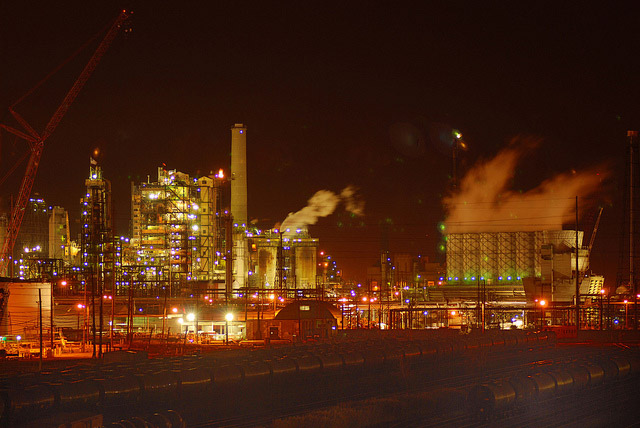Canadian Official In Chicago: Our Oil Is Green
By JoshMogerman in News on Mar 10, 2013 9:30PM
Bizarro World came to the Chicago Council on Global Affairs last week when a top Canadian official popped in to greenwash one of the world's most controversial energy projects.
Chicagoland has long been at the epicenter of refining for tar sands (or, as the industry euphemistically calls it, "oil sands"), the super-heavy petroleum often referred to as the “dirtiest oil on the planet" because it is the most carbon-heavy oil in the world. So it's no surprise that Joe Oliver, Canada’s Natural Resources Minister, would feel comfortable pitching his country’s tarsands and the much-battled-over Keystone XL pipeline that would move it at a gathering of influential Chicagoans. But you have to wonder if he went a bit over the top in praising the most greenhouse gas-erific petroleum in the world as "a greener alternaive" in a speech touting Keystone's merits to the Chicago Council on Global Affairs. The Minister also pimped the pipeline project to Mayor Emanuel and suburban pipefitter union members, who were told: "Canada is a global environmental leader … and yes, that includes the oil sands," by Minister Oliver.
The response North of the border was swift, with a brutal opinion page takedown of the green label appearing in the Globe & Mail that noted:
Let's be clear. Every independent study, including one from the U.S. Department of Energy, has found that the oil sands are one of the world’s dirtiest forms of oil, producing three times more emissions per barrel produced and 22 per cent more greenhouse gas emissions than conventional oil (when their full life cycle of emissions, including burning them in a vehicle, is included). While Mr. Oliver claimed this week that the oil sands were "getting greener," citing statistics that showed per-barrel emissions dropping between 1990 and 2010, he failed to mention that since 2010 per barrel emissions have increased by 21 per cent.
Ouch.
Oliver rightly noted that tar sands production supports a lot of jobs in Illinois, but his analysis overlooked one significant potential local economic impact of the proposed Keystone XL pipeline: gas prices. Currently, there is a glut of tar sands oil coming in the United States—much of it making its way to the Upper Great Lakes where refiners are able to purchase it at a discount because so few facilities are equipped to process the hard-to-handle heavy oil (BP’s Whiting, IN refinery, Citgo’s Lemont Refinery and ExxonMobil’s Joliet Refinery all process tar sands oil). The Keystone XL pipeline is designed, in part, to eliminate that cost differential by delivering tar sands oil to the Gulf Coast. By moving oil out of the Midwest, the oil companies will force refiners around here to pay the globally traded price for all the barrels they buy. And you can imagine who will end up paying that increased cost. As hard as it is to believe Chicago’s gas prices could get higher, it is likely that Keystone XL would goose consumer costs upward at the pump. That’s a different sort of green than Minister Oliver had in mind…
